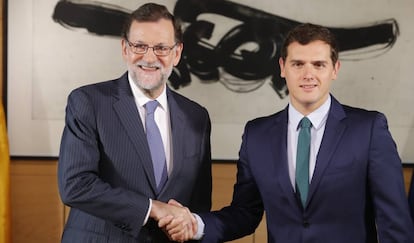PP deal with Ciudadanos will be a tough sell in Congress, parties admit
A Socialist abstention is required to let Mariano Rajoy become the next prime minister at this week’s investiture vote, but that is not likely to happen

Following a week of talks, acting Prime Minister Mariano Rajoy and Ciudadanos leader Albert Rivera on Sunday ratified a deal that ensures the emerging party’s support for Rajoy’s imminent reinstatement bid.
Under the terms of the agreement, Ciudadanos’ 32 deputies will vote yes for the Popular Party (PP) candidate at the investiture debate scheduled to begin in Congress on Tuesday.
But even this will not be enough to secure the post, which requires 176 “yes” ballots in the first round of voting. If the small Canary Coalition party lends its weight to the PP-Ciudadanos bloc, Rajoy will obtain 170 votes and move to a run-off in which he will at least need 11 abstentions from other parties in order to return to office.
The gist of the deal
The PP-Ciudadanos deal includes proposals that will never materialize unless they get support from other parties in Congress, such as the reduction of Spain’s senatorial positions.
Both parties have yielded some ground. Ciudadanos, for instance, has given up on its desire to eliminate Spain's provincial authorities, the diputaciones, in a bid to streamline government. In return, the PP agrees to reduce spending by a billion euros on the diputaciones and other government agencies.
Other measures in the deal include a subsidy for low-income households, free schoolbooks, and a tougher stand on tax fraud.
“The agreement is very positive, but insufficient,” admits Rajoy. “I don’t know in an absolute way what will happen at the vote, but I feel comfortable with this deal.”
If the PP candidate fails and no alternative prime minister is found, Spain will be facing an unprecedented third general election, due to be held on Christmas Day according to the strict time frames of Spanish electoral law. Two inconclusive elections took place in December and June, followed by fruitless negotiations between the four main parties on the Spanish political scene: the traditional PP and Socialist Party (PSOE), and the newcomers Ciudadanos and Podemos.
The PP-Ciudadanos deal closely resembles a similar agreement reached between Ciudadanos and the PSOE shortly after the original December election. That deal fell short of a congressional majority and the Socialist candidate, Pedro Sánchez, failed in his own investiture bid.
Now, Rajoy and Rivera are asking Sánchez to help them, but the Socialist nominee seems disinclined to do so despite internal pressure from other party leaders who feel that the PSOE should abstain at the investiture vote, thereby allowing Rajoy to win reinstatement and take the country out of a prolonged stalemate.
Sánchez has described the PP-Ciudadanos deal as “conservative” and a way to “maintain the status quo.” Ciudadanos, on the other hand, says that 100 of the deal’s 150 points are exactly the same as those included in its earlier agreement with the PSOE.
The agreement is very positive, but insufficient
Acting PM Mariano Rajoy
“The measures we have negotiated with the PP, together with the pact we signed with the PSOE, represent the most important set of reforms signed by any two political parties in the last 25 years in this country,” said Rivera.
Spain has had an interim government for the last eight months, and crucial issues such as the 2017 budget debate have been placed on hold throughout this time. Rajoy has noted that Spain needs to meet upcoming EU deadlines in connection with deficit targets, and that this cannot be done without a fully functioning government in place.
English version by Susana Urra.
Tu suscripción se está usando en otro dispositivo
¿Quieres añadir otro usuario a tu suscripción?
Si continúas leyendo en este dispositivo, no se podrá leer en el otro.
FlechaTu suscripción se está usando en otro dispositivo y solo puedes acceder a EL PAÍS desde un dispositivo a la vez.
Si quieres compartir tu cuenta, cambia tu suscripción a la modalidad Premium, así podrás añadir otro usuario. Cada uno accederá con su propia cuenta de email, lo que os permitirá personalizar vuestra experiencia en EL PAÍS.
¿Tienes una suscripción de empresa? Accede aquí para contratar más cuentas.
En el caso de no saber quién está usando tu cuenta, te recomendamos cambiar tu contraseña aquí.
Si decides continuar compartiendo tu cuenta, este mensaje se mostrará en tu dispositivo y en el de la otra persona que está usando tu cuenta de forma indefinida, afectando a tu experiencia de lectura. Puedes consultar aquí los términos y condiciones de la suscripción digital.








































